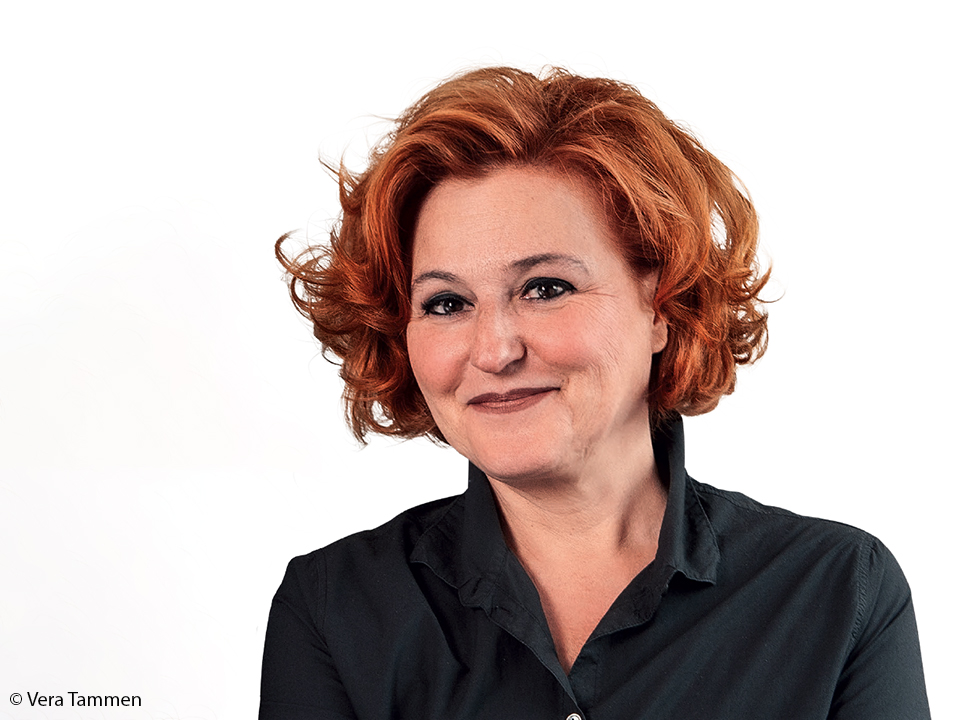Retirement is supposed to be the time to take it easy. In practice, however, retirement often isn’t so easy. In the U.S., a growing number of people are choosing to continue working past retirement age (66–67) — or even to “unretire,” to return to the workforceerwerbstätige Bevölkerungworkforce after retiring. A recent surveyUmfragesurvey by the American staffing associationVerband der PersonalvermittlungsbrancheStaffing Association found that one-third of all U.S. retireeRentner(in)retirees have considered going back to work.
Data suggest sth.etw. vermuten lassensuggests that many older people who continue to work (or return to work) feel compelled to do sth.sich genötigt sehen, etw. zu tunfeel compelled to do so by financial insecurity — especially givenhier: angesichtsgiven the high inflation of the past several years. Other factors also play a role, however, including benefits for health and longevitylanges Lebenlongevity, and a desire to keep busy.
Although it’s happening more frequently, it is not easy for someone over 60 to apply for sth.sich für etw. bewerbenapply for a job. According to the American Association of Retired Persons (AARP), about two-thirds of U.S. workers aged 50 and over have seen or experienced ageismAltersdiskriminierungageism in the workplace. Despite the challenges, many people make successful late-life career changes — Business Spotlight speaks to three Americans who have not let age stand in their way.
Corally Ridge, 70
Lives in: Marble, Texas
Retired: April 2022
Previous careers: dental assistant; chefKoch/Köchinchef
Now working as: professional wine demonstrator, since 2023
After being a dental assistant for 17 years, I became a manager at the corporationKonzerncorporation H-E-B at 60. But what I really wanted to be was a chef. So, I went to culinary schoolKochschuleculinary school, got my chef’s title at 63 and started working for the same company as a chef. A few years later, I was made a manager and given another department to supervise, but I didn’t want to take that on because I thought it’d be too stressful. I had intended to work until 70, but my son’s wife got pregnantschwangerpregnant, and I wanted to be a hands-onhier: tatkräftig unterstützendhands-on grandmother. So, at age 67, I retired.
I now have more than one grandchild, but I’m needed for babysitting only sometimes. I felt I’d done my job as a parent, but I was missing the stimulation I got from working as a chef.
It was time for a change. I gave away almost everything I owned and moved to a remoteabgelegenremote RV park (recreational vehicle park) (US)Wohnwagen-, TrailerparkRV park, surrounded by hills and beautiful lakes. Many people thought I was crazy, but life is more affordableerschwinglichaffordable in an RV. When I was offered a job doing wine demonstrations at events on a part-time basis, I jumped at the jump at the chancedie Chance ergreifenchance. I choose my own hourshier: Arbeitszeit(en)hours and even get to take home whatever’s left at the end of the night. I’m a chef, so I recommend dishes to pair with sth.hier: zusammen mit etw. kredenzenpair with the wine. I work a few days a week to save up for vacations.
I have it all now — relaxation, work and family time. As long as I’m healthy, I’ll work until they work until one drags sb. out of the parking lot (US)hier etwa: arbeiten bis zum Umfallendrag me out of the parking lot. If you sit down and quitaufgeben, aufhörenquit, it’s over. My advice is when you’re 30, start planning for 60; when you’re 40, start planning for 70; and when you’re 50, start planning for 80.
I’ll work until they drag me out of the parking lot
Douglas Barnett, 70
Lives in: West Columbia, South Carolina
Retired: November 2022
Previous careers: economist; property managerImmobilienmanager(in)property manager
Now working as: property manager again, since April 2023
At the age of 58, I retired from my job as an economist at the African Development Bank. After 30 years in Africa, my family and I returned to my wife’s home state, South Carolina. My first retirement didn’t last long because, at my wife’s family’s request, I began managing their business, a multi-family residential parkWohnparkresidential park.
Property management was a new activity for me, but my background in economics and finance helped. There were a number of immigrants living at the siteauf dem Geländeat the site, which gave the place an international feel — something I missed from my time abroad. I also taught economics and business part-time as an online adjunct instructor (US)Lehrbeauftragte(r)adjunct instructor.
At 68, I began what I thought was my retirement. I planned to go to the gymFitnessstudiogym, develop a community garden and work on small-scalekleinsmall-scale educational projects in Africa. But then, the new property manager resigned — because she got pregnant. So, my second retirement was actually a six-month furlough (US)Urlaubfurlough. I enjoyed it but, at the same time, there were some pocketshier: Zeitenpockets of boredomLangeweileboredom. I wasn’t entirely disappointed about returning to work.
The absence allowed me to rest and reframe sth.etw. neu ausrichtenreframe how I approach sth.etw. angehenapproached the job. I visit the park less often myself now and rely on sb.sich auf jmdn. verlassenrely more on other people who are there. The additional income is helping to pay for a garden and other upgradehier: Verbesserungupgrades at home. And the business (and I) benefit from having extra handshier: Arbeitskräftehands whose scheduleTerminplanschedules are flexible and can be paid by the hour.
Bev O’Shea, 68
Lives in: Woodstock, Georgia
Retired: never
Previous career: leadLeitartikellead writer at the personal finance
company NerdWallet
Now working as: freelance writer and editorRedakteur(in)editor
Last year, I decided to leave my full-time job to go freelancesich selbstständig machengo freelance. When health issueProblemissues forced me to try a part-time schedule temporarily, I initially thought that was the solution, as it came with a regular paycheck (US)Gehaltsscheckpaycheck. But freelancing for various clients has broadened what I write and edit, and it enables me to make more money than part-time jobs typically pay.
Most of my coworkers were surprised when I left, but I wasn’t aware that anyone had thought I was retiring — until someone wrote “enjoy those grandchildren” on an e-card. Quitting a permanent position to go freelance doesn’t involve a pension, even if I’m old enough to sign up for sth.sich für etw. anmelden; hier: etw. beantragensign up for Social Security (US)hier: staatliche RentenversicherungSocial Security. I’m still saving for my retirement now, and when I do take Social Security, the check will be larger.
I learned that, as a freelancer, I could invent my dream job by cherry-pick sth.sich die Rosinen aus etw. herauspickencherry-picking the assignmentAuftragassignments that sounded the most fun. There were some challenges, of course. Back when I studied journalism, the online world and search engine optimization didn’t exist. Sometimes, I was so far out of my comfort zone, I wondered if I would ever feel competent again. But I think curiosity and a desire to try new things are essential, regardless of age.
I’ve seen people stay in a job because they were afraid that age discrimination would make it hard to find another job, but the only positive that comes of that is higher employee retentionMitarbeiterbindungemployee retention.

THE POWER OF GOODBYE
After decades at DIE ZEIT, our colleague SABINE RÜCKERT has decided not to retire or take on more responsibility, but rather to give up her managerial positions. Here, the hostGastgeber(in), Moderator(in)host of the podcasts ZEIT VERBRECHEN and Unter Pfarrerstöchtern shares her thoughts with Business Spotlight.
Franz Kafka wrote about people you wouldn’t want to meet in real life. These include those bureaucrat[wg. Aussprache]bureaucrats so comfortable in their offices that they lock the windows to avoid too much light and fresh air. For them, freedom is suffocatingerstickend, erdrückendsuffocating.
My office at DIE ZEIT has nothing to do with Kafka’s office dystopia[wg. Aussprache]dystopias. I’ve always found working here inspiring. Still, after 12 years as department headAbteilungsleiter(in)department head and deputy editor-in-chiefstellvertretende(r) Chefredakteur(in)deputy editor-in-chief, with meetings, responsibilities, performance pressure, always having to be available and the creepingschleichendcreeping feeling that, beyond the age of 60, I was blocking accessZugangaccess for a generation of newcomers, I felt an urgent need to, well, go outside.
Not everyone understood. For most journalists, being deputy editor-in-chief at a publication like DIE ZEIT is the greatest professional achievement — and that’s true. You work with intelligent people. You influence personnelPersonalpersonnel decisions and discourseDiskursdiscourse within the newspaper and, by extensionim weiteren Sinneby extension, in society in general. You have creative power. You are important. You’re invited to receptionEmpfangreceptions and events by other important people, and that’s great — until one day, you realize that you yourself are beginning to disappear behind your work. You devote sth.etw. widmendevote your professional life to cultivate sth.hier: etw. förderncultivating and nurture sth.etw. hegen; hier: unterstützend begleitennurturing the ideas and texts and biographies of others. And you experience what the word “functionary” means first-hand: the machine has to produce, and so do I.
That has stopped for me since January 2024. Now, I listen to music in the car or in the bathroom and not just to news on a on a continuous loopin Dauerschleifecontinuous loop. I am still at DIE ZEIT but, now, I actually have Zeit — time for all the smaller things and projects that have been brewgären; hier: sich entwickelnbrewing in me for years. I’m no longer a boss. I no longer tell anyone what to do. Now, when people invite me or speak to me, they want me, there’s no ulterior motiveHintergedanke(n)ulterior motive. I like that. Not being important is a fine thing and it’s inevitableunvermeidlich, unausweichlichinevitable for everyone. It’s better to choose the time yourself.
Neugierig auf mehr?
Dann nutzen Sie die Möglichkeit und stellen Sie sich Ihr optimales Abo ganz nach Ihren Wünschen zusammen.



